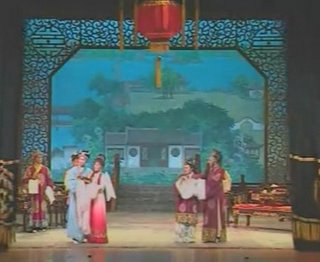 Title: The Jade Pagoda (珍珠塔)
Title: The Jade Pagoda (珍珠塔)Genre: Shaoxing Yue opera (越剧)
Format: Stage opera
Production year: Around 2004 - 2005
Director: Sun Hongjiang
Script: Li Li, Huang Yan
Music: Liu Jiankuan
Scenography: Xie Tongmiao, Ding Baodi
Casts: Xu Biaoxin as Fang Qing, Deng Huawei as Chen Cui’E, Zhou Yan’er as Fang Duohua, Gu Aijun as Chen Peide, Qi Chunlei as Old woodcutter, Xu Lai as Cai Ping, Ye Yuanpei as Hong Yun
 At first glance...
At first glance... ”The Jade Pagoda” is one of the traditional shows for Shaoxing Yue opera. But unlike most other shows whereby the main focus is on the female leads, this show focuses more on the male lead. This version, a revised version of the old script, was a very recent production, features Xu Biaoxin, an up and rising male Shaoxing Yue opera actor Xu Biaoxin as the male lead, Fang Qing.
Synopsis
Fang Qing was the grandson of a prime minister, but due to political reasons, his family dwindled, with only him and his mother struggling to survive in a graveyard in Henan. He had an uncle, Chen Peide, who was doing well as an imperial official in Xiang Yang and old Mrs. Fang got him to approach them to borrow some money.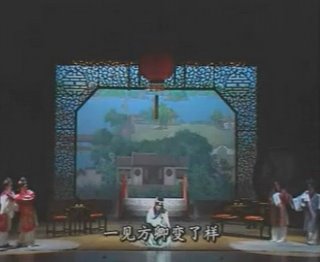 It happened that Fang Qing turned up at Chen’s residence on his birthday celebration, much to the discontentment of Fang Duohua, Fang Qing’s paternal aunt. She despised Fang Qing for being poor, and was angry that he made her lose face in front of her guests. Her harsh and unforgiving words left Fang Qing fuming mad and he vowed never to return to Xiang Yang if he failed to become a top scholar. In return, Fang Duohua said that she was willing to kneel down in front of him with a tray of incense urn as a form of welcome (a taboo for an elder to perform to a junior) if he could really make it.
It happened that Fang Qing turned up at Chen’s residence on his birthday celebration, much to the discontentment of Fang Duohua, Fang Qing’s paternal aunt. She despised Fang Qing for being poor, and was angry that he made her lose face in front of her guests. Her harsh and unforgiving words left Fang Qing fuming mad and he vowed never to return to Xiang Yang if he failed to become a top scholar. In return, Fang Duohua said that she was willing to kneel down in front of him with a tray of incense urn as a form of welcome (a taboo for an elder to perform to a junior) if he could really make it. Fang Qing’s cousin Cui’E found out about their quarrel and hence decided to apologise to Fang Qing on her mother’s behalf. She was willing to help Fang Qing, but the latter was however unwilling to accept her financial assistance. Cui’E, who already had a liking for Fang Qing, decided to help in an implicit way; she hid her family heirloom, the jade pagoda, in a box of snacks and asked Fang Qing to take it back for his mother. At this juncture, Chen Peide turned up to stop Fang Qing from leaving. Chen admired Fang Qing for his character, hence decided to betroth Cui’E to him. Fang Qing could not refuse, and hence agreed to the marriage.
Fang Qing’s cousin Cui’E found out about their quarrel and hence decided to apologise to Fang Qing on her mother’s behalf. She was willing to help Fang Qing, but the latter was however unwilling to accept her financial assistance. Cui’E, who already had a liking for Fang Qing, decided to help in an implicit way; she hid her family heirloom, the jade pagoda, in a box of snacks and asked Fang Qing to take it back for his mother. At this juncture, Chen Peide turned up to stop Fang Qing from leaving. Chen admired Fang Qing for his character, hence decided to betroth Cui’E to him. Fang Qing could not refuse, and hence agreed to the marriage. While on his way back home, Fang Qing was caught in a snowstorm. Unable to continue his journey due to hunger, he decided to help himself to some snacks first. He was astonished when he found the jade pagoda in the snack box, and finally realised the good intention of his cousin. However, a robber appeared unexpectedly and robbed him of the jade pagoda. Fang Qing was demoralised and wanted to commit suicide, but was saved by an old woodcutter. He decided to give Fang Qing some money so that he could realise his dream.
While on his way back home, Fang Qing was caught in a snowstorm. Unable to continue his journey due to hunger, he decided to help himself to some snacks first. He was astonished when he found the jade pagoda in the snack box, and finally realised the good intention of his cousin. However, a robber appeared unexpectedly and robbed him of the jade pagoda. Fang Qing was demoralised and wanted to commit suicide, but was saved by an old woodcutter. He decided to give Fang Qing some money so that he could realise his dream.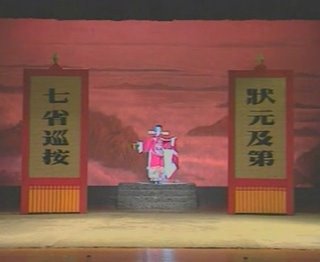 Fang Qing finally became the top scholar and was appointed as the Chief Inspectorate. He decided to pay a visit to Chen’s residence again, but this time, he shall disguise himself as a Dao Qing (a form of folk singing based on moral and social themes, usually performed by beggars and Taoist priests) singer, hoping to “educate” his aunt.
Fang Qing finally became the top scholar and was appointed as the Chief Inspectorate. He decided to pay a visit to Chen’s residence again, but this time, he shall disguise himself as a Dao Qing (a form of folk singing based on moral and social themes, usually performed by beggars and Taoist priests) singer, hoping to “educate” his aunt. Fang Duohua, however, remained unmoved by his actions, and was in fact very angry that his songs were all pinpointing at her. Chen Peide and Cui’E however, welcomed Fang Qing warmly. When Fang Qing’s subordinates turned up to look for Fang Qing, everyone finally realised that Fang Qing had really became a top scholar. Fang Duohua was ashamed of her past actions, and decided to accept Fang Qing as her son-in-law wholeheartedly.
Fang Duohua, however, remained unmoved by his actions, and was in fact very angry that his songs were all pinpointing at her. Chen Peide and Cui’E however, welcomed Fang Qing warmly. When Fang Qing’s subordinates turned up to look for Fang Qing, everyone finally realised that Fang Qing had really became a top scholar. Fang Duohua was ashamed of her past actions, and decided to accept Fang Qing as her son-in-law wholeheartedly.
Review
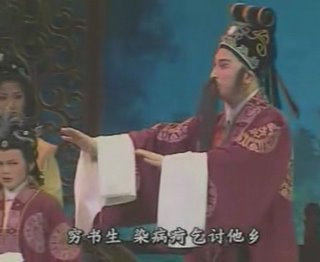 This remake of “The Jade Pagoda” features a big change of the original script. In the original script, there was no woodcutter, and instead of Fang Qing educating his aunt, the original version featured Fang Qing trying to shame his aunt, and was reprimanded by his mother for being unforgiving. According to the director, such a change was done to bring out the essence of hope after a mishap, and to soften the original “hatred versus hatred” feel. This was a good attempt, though I’d prefer to see Fang Qing shaming his aunt!
This remake of “The Jade Pagoda” features a big change of the original script. In the original script, there was no woodcutter, and instead of Fang Qing educating his aunt, the original version featured Fang Qing trying to shame his aunt, and was reprimanded by his mother for being unforgiving. According to the director, such a change was done to bring out the essence of hope after a mishap, and to soften the original “hatred versus hatred” feel. This was a good attempt, though I’d prefer to see Fang Qing shaming his aunt!
Although I have not seen the original version by Lu Jinhua, somehow I have this feeling that this show was tailor-made for Xu Biaoxin. For a start, he used to be a top actor in Changzhou Xi Opera Troupe, but was said under strong recommendation to be transferred to Shanghai Yue Opera Company, and then subsequently heavily promoted by the troupe. “The Jade Pagoda” happened to be the best show to showcase his talent, since the male lead has quite significant role. Also, I felt that he has got a lot of singing parts, at times to the point of almost becoming too excessive. But nevertheless, his singing was really quite good, and he managed to perform all the stunts designed for his role in the third scene, the scene where he was trapped in a snowstorm and met a robber. As for the rest of the cast, Zhou Yan’er and Deng Huawei, who acted as Fang Duohua and Chen Cui’E, were not bad as well, but others were average. Zhou Yan’er’s portrayal of Fang Duohua was not as clownish as compared to others, but more mean and unfeeling. This might have been the director’s idea, but somehow I felt that it dimmed down the role of fang Duohua quite a bit. For example, when Fang Duohua was singing how big and nice the Fang Residence she used to live (before she was married to Chen Peide), her straight face and prim and proper actions just do not match with her exaggerating lyrics. Deng Huawei’s rendition of Chen Cui’E was not too good in my opinion too. Although her singing and shen duan were not bad, I think the role of Chen Cui’E should be more elegant and matured, so as to bring a contrast between her and Fang Qing, for she’s supposed to be older than Fang Qing. Gu Aijun, who took on the role of Chen Peide, could sing well too, but his shen duan was rather average. One actor I wanted to point out was Xu Lai, who acted as Cui’E’s maid Cai Ping in the show. I felt she has potential to become a good actress, but her singing could pose a problem as her voice sounded deep.
As for the rest of the cast, Zhou Yan’er and Deng Huawei, who acted as Fang Duohua and Chen Cui’E, were not bad as well, but others were average. Zhou Yan’er’s portrayal of Fang Duohua was not as clownish as compared to others, but more mean and unfeeling. This might have been the director’s idea, but somehow I felt that it dimmed down the role of fang Duohua quite a bit. For example, when Fang Duohua was singing how big and nice the Fang Residence she used to live (before she was married to Chen Peide), her straight face and prim and proper actions just do not match with her exaggerating lyrics. Deng Huawei’s rendition of Chen Cui’E was not too good in my opinion too. Although her singing and shen duan were not bad, I think the role of Chen Cui’E should be more elegant and matured, so as to bring a contrast between her and Fang Qing, for she’s supposed to be older than Fang Qing. Gu Aijun, who took on the role of Chen Peide, could sing well too, but his shen duan was rather average. One actor I wanted to point out was Xu Lai, who acted as Cui’E’s maid Cai Ping in the show. I felt she has potential to become a good actress, but her singing could pose a problem as her voice sounded deep. Script and cast apart, one other highlight of the show was the scenography. One can’t help but to think of the remake of “Dream of the Red Chamber”, as the style of the set resembled that of “Dreams”, but on a slightly smaller scale. One aspect of the scenography I like is the secondary curtain. Instead of the conventional draw curtain, they used a big traditional Chinese scroll painting as a secondary curtain which I think went well with the overall set. The painting, which features a scenery painted the Jiangnan style, added a touch to beauty to the set, giving a hint of how beautiful Xiangyang city was.
Script and cast apart, one other highlight of the show was the scenography. One can’t help but to think of the remake of “Dream of the Red Chamber”, as the style of the set resembled that of “Dreams”, but on a slightly smaller scale. One aspect of the scenography I like is the secondary curtain. Instead of the conventional draw curtain, they used a big traditional Chinese scroll painting as a secondary curtain which I think went well with the overall set. The painting, which features a scenery painted the Jiangnan style, added a touch to beauty to the set, giving a hint of how beautiful Xiangyang city was.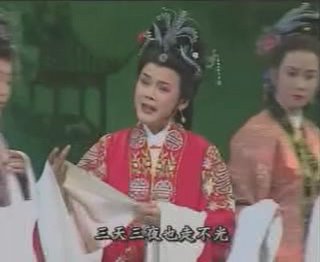 To sum things up, I think this show is indeed not bad, but could improve further. In terms of acting, the actors’ shen duan were not bad, but just lack the extra touch to make their character more outstanding. Perhaps with time they’d improve, and I hope they do!
To sum things up, I think this show is indeed not bad, but could improve further. In terms of acting, the actors’ shen duan were not bad, but just lack the extra touch to make their character more outstanding. Perhaps with time they’d improve, and I hope they do!
Ratings
Script
Music
Scenography
Casts
Video quality
Final rating


3 comments:
Sun Hongjiang is also the director of "The Dreams of the Red Chamber". I met him when I was in Shanghai in year 2000. I was with XZ and we were making costumes for our "Hong Lou Meng". Director Sun told me that I must be doing the role of Xue Bao Chai. I just smiled and didn't borther to tell him that he made the wrong guess. Anyway, it wasn't a must to let him know what my role was. I was more interested in eating my dinner then.(LOL)
I see! I think his production of this show not bad. But I still prefer Xiju version.. haha...
Post a Comment